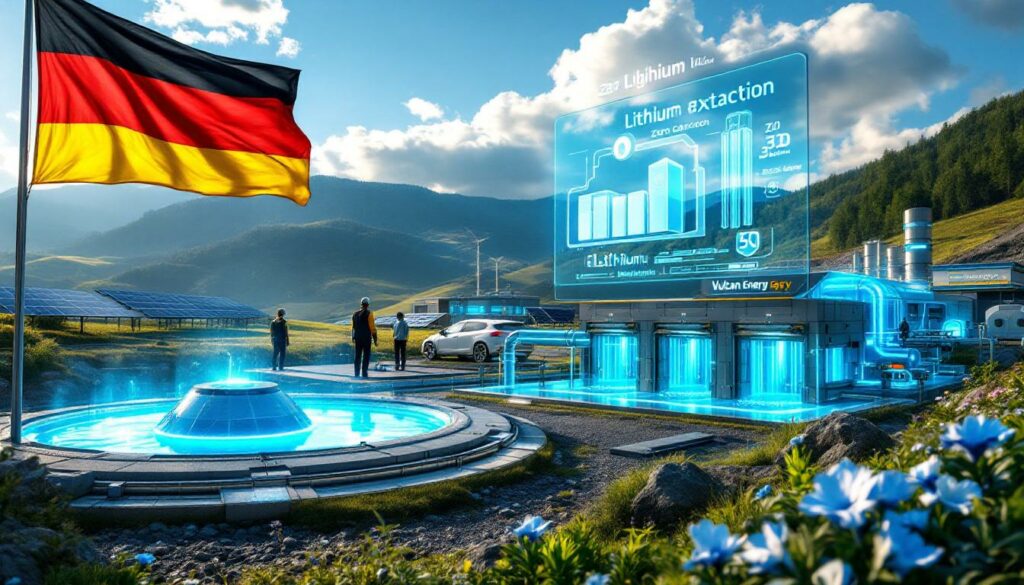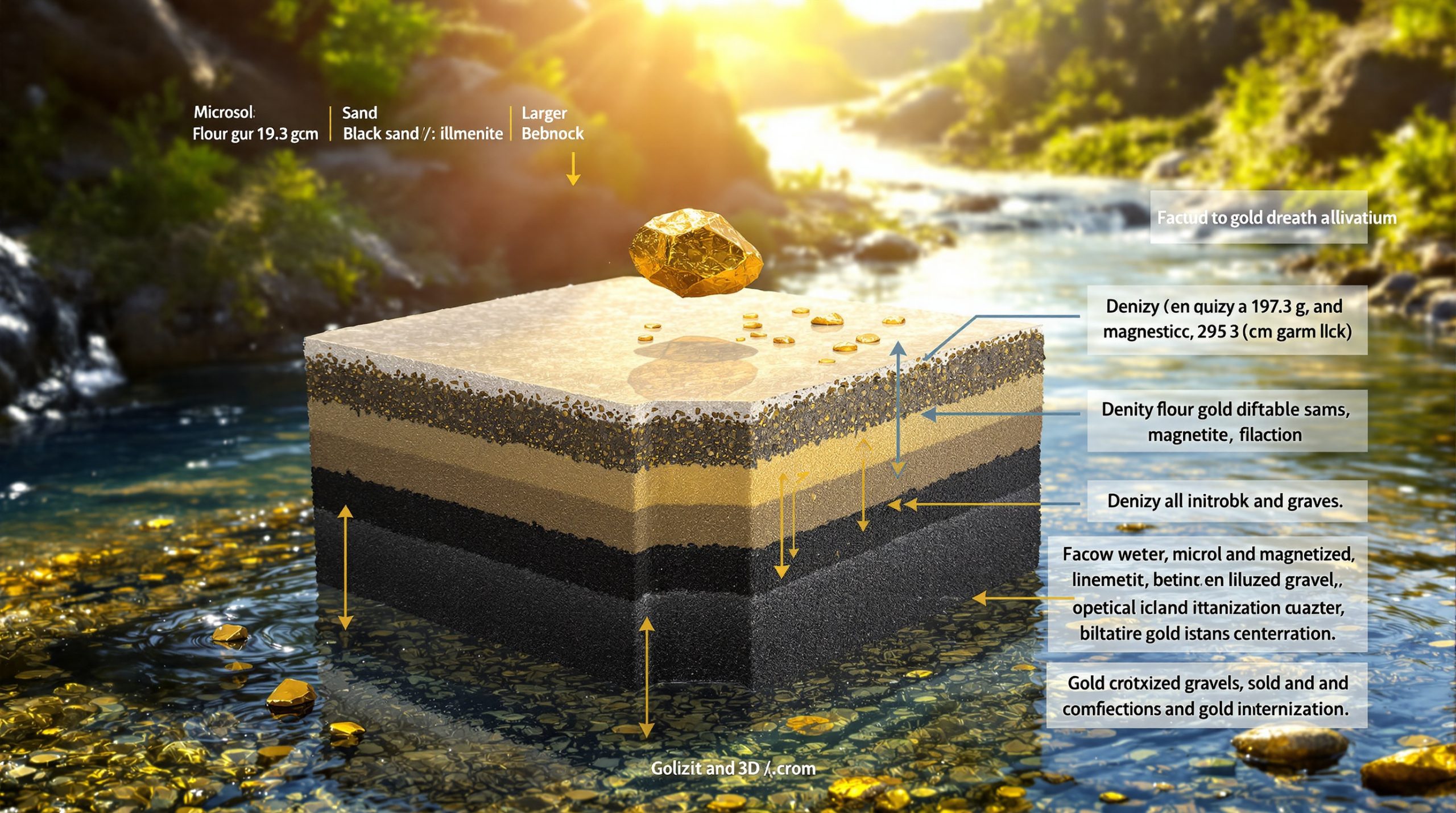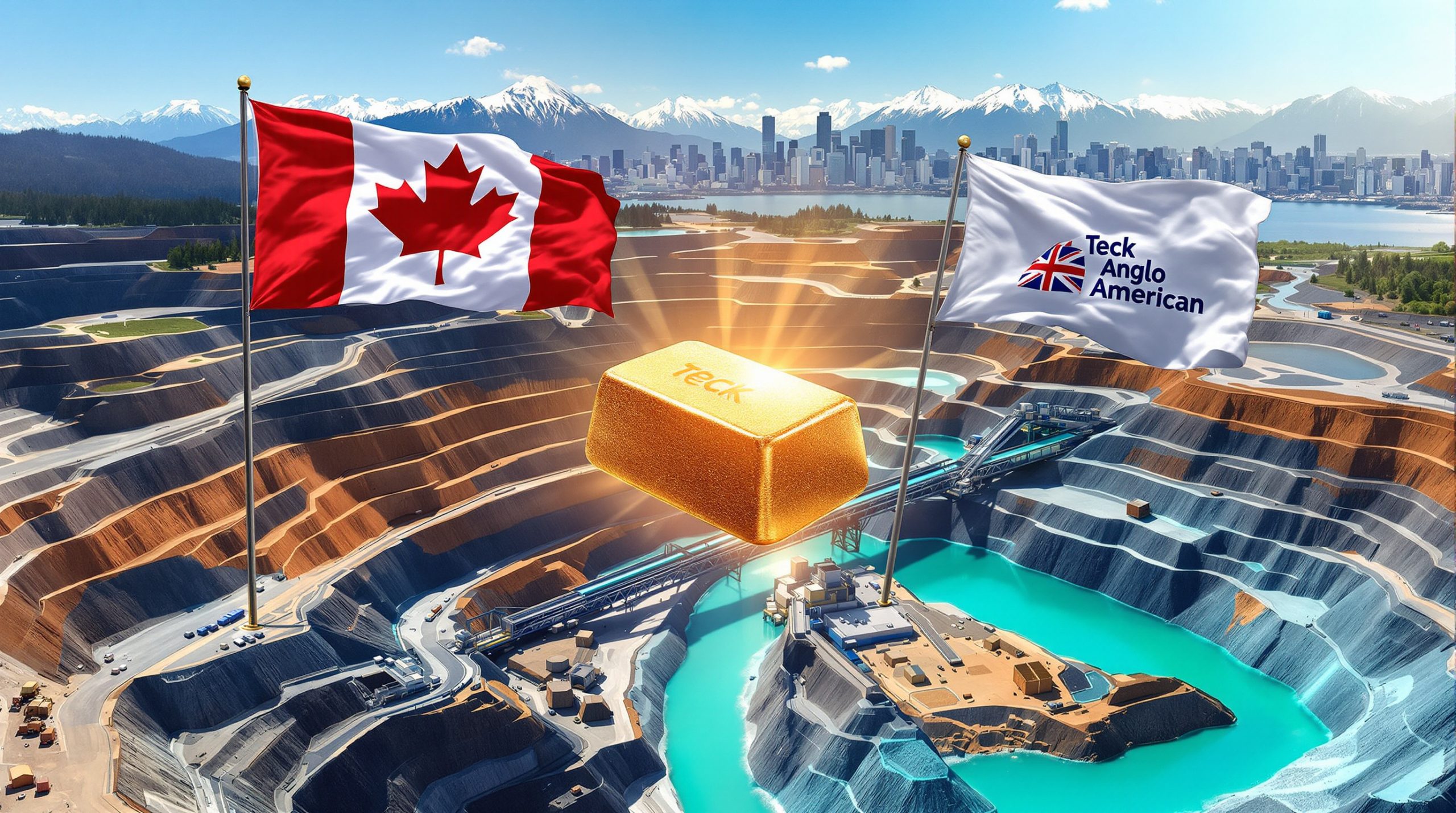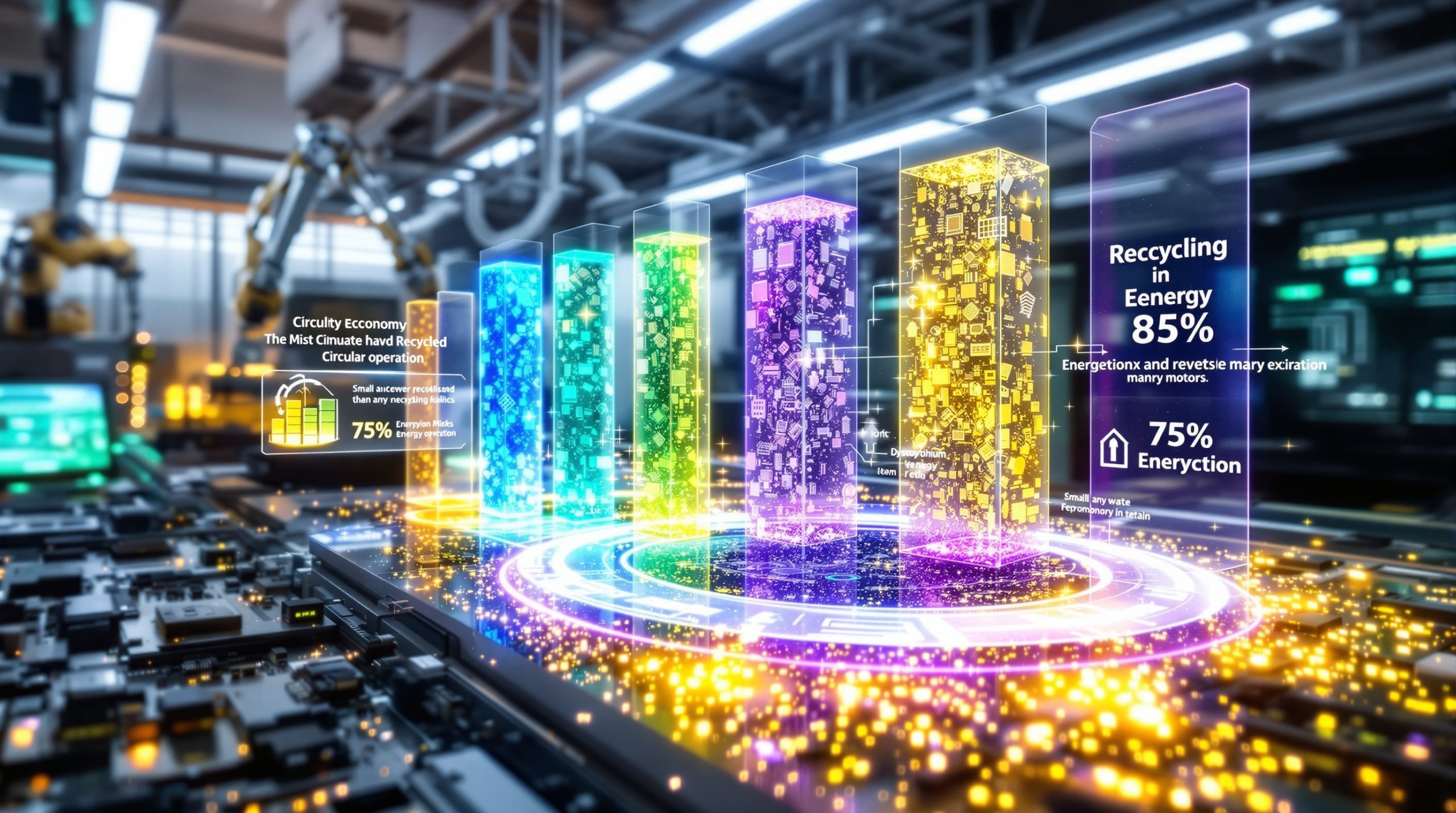Vulcan Energy Secures €104 Million in German Grants to Transform Europe's Lithium Supply Chain
Germany has made a landmark investment in domestic lithium production, awarding Vulcan Energy a substantial €104 million ($122 million) grant package. This funding represents a strategic move to establish local lithium production capabilities and strengthen Europe's battery manufacturing ecosystem amid growing global competition for critical minerals.
The grant, provided by the German federal government and the state governments of Rhineland-Palatinate and Hesse, will support Vulcan's pioneering zero-carbon lithium extraction technology. The funding will be disbursed over 36 months beginning October 1, 2025, specifically targeting the development of sustainable lithium production facilities in Germany's Upper Rhine Valley.
What is Vulcan Energy's Recent Grant Achievement?
Vulcan Energy's €104 million ($122 million) grant marks a watershed moment for European battery material supply chains. This substantial funding package has been allocated from both federal sources and regional governments of Rhineland-Palatinate and Hesse, demonstrating multi-level governmental support for the initiative.
"This grant represents one of the largest government investments in sustainable lithium production within the EU to date," notes Dr. Francis Wedin, Vulcan Energy's CEO. "It validates our technology approach and recognizes the critical importance of establishing domestic lithium supply chains."
The funding is structured as a non-dilutive grant rather than a loan, significantly enhancing Vulcan's financial position without adding debt or diluting shareholder equity. While substantial, industry analysts point out that the grant likely covers approximately 30-40% of the total project cost, with Vulcan expected to secure additional financing through traditional channels.
Grant Details and Structure
The €104 million package is designed to support three key aspects of Vulcan's lithium project:
- Research and development: Approximately 25% allocated to refining extraction techniques
- Infrastructure development: Roughly 45% dedicated to production facilities
- Operational scale-up: The remaining 30% supporting commercial deployment
The 36-month disbursement timeline aligns with Vulcan's phased development approach, with funding released against specific project milestones rather than as an upfront payment. This structure helps mitigate risk for both the government and the company while ensuring accountability throughout the development process.
German Economy Minister Robert Habeck emphasized that "this investment isn't merely about securing raw materials—it's about positioning Germany at the forefront of sustainable extraction technologies that align with our climate objectives."
Why is Germany Investing in Domestic Lithium Production?
Germany's substantial investment in Vulcan Energy reflects a strategic pivot toward securing domestic supply chains for critical minerals. The nation's automotive sector, a cornerstone of its economy accounting for approximately 5% of GDP, is rapidly transitioning to electric vehicle production—creating unprecedented demand for battery materials.
According to the European Battery Alliance, Europe's lithium demand is projected to increase by 3,500% by 2030, while current domestic production satisfies less than 1% of requirements. This stark supply-demand imbalance has created a strategic vulnerability that German policymakers are determined to address.
"The volatility we've witnessed in lithium markets—with prices fluctuating between $8,000 and $80,000 per tonne in recent years—demonstrates the risks of overreliance on imports," explains Dr. Monika Weber, resources economist at the German Institute for Economic Research. "Domestic production offers a hedge against both price volatility and geopolitical risks."
Strategic Importance of Lithium for European Industry
Lithium has emerged as perhaps the most critical mineral for Europe's industrial future for several compelling reasons:
- EV battery production: Lithium-ion batteries remain the dominant technology for electric vehicles, with each standard EV requiring 8-10kg of lithium
- Grid-scale energy storage: Essential for managing intermittent renewable energy sources
- Industrial competitiveness: Local lithium production could reduce battery costs by an estimated 5-8% through eliminated shipping and tariffs
- Supply chain resilience: Shortened supply chains provide protection against global disruptions
The German government's comprehensive Raw Materials Strategy 2025 specifically identifies lithium as a "super-critical mineral" requiring priority investment due to its irreplaceability in current battery chemistries and the lack of commercially viable alternatives at scale.
Europe's Current Lithium Supply Challenges
Europe's lithium supply situation represents a significant vulnerability in its industrial strategy. Current dependency metrics highlight the severity of the challenge:
- Import reliance: Europe imports over 99% of its lithium requirements
- Geographic concentration: 75% of processed lithium comes from China
- Price volatility: Lithium carbonate prices fluctuated by over 400% between 2021-2023
- Processing bottlenecks: Limited European refining capacity for battery-grade materials
Recent supply chain disruptions during the pandemic demonstrated the fragility of extended global supply chains. When Chinese lithium processing facilities temporarily closed in 2022, European battery manufacturers faced delays and price premiums of up to 25% for available material.
"Europe's dependency on imported battery materials represents perhaps its greatest industrial vulnerability in the transition to electrification," stated Maroš Šefčovič, European Commission Vice President overseeing the European Battery Alliance. "Domestic production isn't merely desirable—it's essential for maintaining European industrial competitiveness."
How Does Vulcan Energy's Technology Work?
Vulcan Energy's extraction methodology represents a fundamental departure from traditional lithium production techniques. The company has developed a unique process that leverages naturally occurring lithium-rich geothermal brines in Germany's Upper Rhine Valley, combining renewable energy generation with mineral extraction in a single integrated system.
This innovative approach extracts lithium from deep underground brine reservoirs heated by natural geological processes. The technology offers a dual benefit: producing lithium while simultaneously generating renewable geothermal energy that powers the extraction process itself.
Zero-Carbon Lithium Extraction Process
Vulcan's process works through several distinct phases:
- Geothermal brine extraction: Hot, mineral-rich brine is pumped from depths of 2,000-4,000 meters where temperatures reach 120-180°C
- Renewable energy generation: The thermal energy is captured to produce electricity through standard geothermal power generation
- Direct lithium extraction: A proprietary adsorption technology selectively captures lithium ions from the brine
- Lithium processing: The captured lithium is further processed into battery-grade lithium hydroxide or carbonate
- Brine reinjection: The depleted brine is returned to the reservoir, maintaining hydrological balance
The process achieves several critical advantages over conventional methods:
- Carbon footprint: Produces approximately -3kg CO₂ per kg of lithium hydroxide (carbon-negative) compared to +15kg CO₂ for conventional methods
- Water usage: Requires less than 2% of the water needed for evaporation ponds
- Land disturbance: Requires approximately 0.3 km² per 25,000 tonnes of LCE (lithium carbonate equivalent) compared to 30-60 km² for evaporation methods
- Production speed: Complete extraction in hours rather than 18+ months for evaporation ponds
Environmental Advantages of Vulcan's Approach
The environmental benefits of Vulcan's approach extend beyond carbon emissions reduction:
- Zero mining waste: No tailings or open pits that characterize hard-rock lithium mining
- Closed-loop water system: Minimal freshwater consumption in a water-constrained region
- Minimal chemical usage: Selective adsorption technology requires fewer processing chemicals
- Small physical footprint: Processing facilities require limited land area compared to traditional methods
Dr. Katharina Schmidt, environmental geochemist at the Technical University of Munich, explains: "What makes Vulcan's approach revolutionary is that it transforms lithium production from an environmentally problematic activity into one that actually generates clean energy while producing a critical material. It represents a paradigm shift in how we think about resource extraction."
The technology aligns perfectly with the EU's proposed Battery Regulation, which will mandate carbon footprint declarations and eventually establish maximum carbon thresholds for batteries sold in the European market.
What Impact Will This Grant Have on European Battery Supply Chains?
The €104 million grant to Vulcan Energy represents more than support for a single company—it signals Germany's commitment to establishing a complete European battery value chain. The investment comes at a pivotal moment as Europe works to catch up with Asian battery manufacturing capacity.
According to the European Battery Alliance, Europe currently has over 40 battery gigafactory projects in various stages of development, representing over 800 GWh of planned capacity by 2030. This manufacturing expansion creates enormous demand for battery materials, with projected lithium requirements exceeding 500,000 tonnes annually by 2030.
Strengthening European Battery Manufacturing Ecosystem
Vulcan's project addresses several critical weaknesses in Europe's current battery supply chain:
- Shortened logistics: Reducing transportation distances from thousands of kilometers to less than 500km for many European manufacturers
- Supply predictability: Creating price stability through long-term offtake agreements with guaranteed volumes
- Reduced carbon intensity: Supporting European manufacturers' sustainability goals with lower-carbon materials
- Regulatory alignment: Meeting EU Battery Regulation requirements for environmental performance
The project is expected to create approximately 2,000 direct and indirect jobs throughout the supply chain, primarily in high-skill technical and engineering roles. These positions will help develop Germany's expertise in the critical minerals sector, establishing capabilities that can be deployed across other resource projects.
"Local lithium production isn't merely about security of supply—it's about creating an innovation ecosystem where battery technology and materials production evolve together," notes Thomas Schmall, Volkswagen Group Board Member for Technology.
Economic Benefits and Market Implications
Vulcan's project offers substantial economic advantages beyond direct employment:
- Price stability: Domestic production with transparent costs can reduce price volatility
- Value chain control: Enabling quality standardization and specification tailoring for European manufacturers
- Reduced logistics costs: Saving an estimated €250-300 per tonne in transportation costs
- Supply chain visibility: Enhancing ESG compliance through fully traceable supply
The project is expected to produce approximately 25,000-40,000 tonnes of battery-grade lithium hydroxide annually when at full capacity—enough to supply batteries for roughly 500,000-800,000 electric vehicles per year. This represents approximately 15-20% of projected European demand by 2030.
Industry analysts project that domestic lithium production could reduce battery costs by 3-5% through eliminated tariffs, reduced logistics expenses, and simplified supply chains. While modest as a percentage, this represents €300-500 per vehicle in absolute terms—a significant competitive advantage in the price-sensitive automotive market.
Where Does This Fit in Germany's Critical Minerals Strategy?
Germany's support for Vulcan Energy is not an isolated initiative but rather a cornerstone of a comprehensive national strategy to secure critical raw materials. The investment aligns with the broader European CRM Facility framework and represents Germany's most significant financial commitment to date in domestic mineral production.
The German government has identified 30 minerals as strategically important, with lithium designated as "super-critical" due to its irreplaceable role in battery technology and projected supply constraints. The Vulcan project directly addresses four key pillars of Germany's minerals strategy:
- Supply diversification: Reducing dependency on concentrated supply sources
- Sustainability leadership: Developing best-in-class environmental standards
- Innovation acceleration: Pioneering new extraction technologies
- Circular economy integration: Designing for eventual recycling and material recovery
Germany's Broader Raw Materials Security Initiatives
Beyond the Vulcan investment, Germany has launched several complementary initiatives:
- Mineral Exploration Fund: €500 million allocation for identifying additional European resources
- Processing Technology Initiative: R&D grants for developing refining capabilities
- Recycling Infrastructure: Support for urban mining and battery recycling facilities
- International Partnerships: Bilateral resource agreements with countries including Chile, Australia, and Canada
The German government estimates that securing domestic battery supply chains could safeguard up to 800,000 automotive industry jobs while creating 30,000+ new positions in battery production and materials processing by 2030.
Comparison to Other European Lithium Projects
While Vulcan's project has received the largest single government grant, several other European lithium initiatives are advancing in parallel:
| Project | Location | Technology | Annual Capacity | Timeline |
|---|---|---|---|---|
| Vulcan Energy | Germany | Geothermal DLE | 25,000-40,000t | 2025-2027 |
| Savannah Resources | Portugal | Hard rock mining | 20,000t | 2026 |
| European Lithium | Austria | Hard rock mining | 10,000t | 2025 |
| Infinity Lithium | Spain | Hard rock mining | 15,000t | 2026 |
| Rio Tinto | Serbia | Jadarite mining | 58,000t | Uncertain |
Vulcan's project offers several distinct advantages compared to these alternatives:
- Carbon footprint: The only carbon-neutral or negative project among major initiatives
- Production speed: DLE technologies typically reach full production faster than mining operations
- Scalability: Potential to expand across the broader Rhine Valley geothermal field
- Public acceptance: Higher community support due to minimal surface disturbance and environmental impact
The geothermal DLE approach also faces fewer permitting hurdles than traditional mining operations, which have encountered significant community opposition in several European locations. This regulatory advantage potentially offers a faster path to production than competing projects.
When Will Vulcan's Lithium Production Begin?
The €104 million grant significantly accelerates Vulcan Energy and German grants for clean lithium production timeline, though the company still faces several technical and regulatory milestones before reaching commercial production. The phased approach allows for progressive scaling and optimization of the technology.
Project Development Timeline
Vulcan's project will advance through several distinct phases:
- Demonstration plant (2023-2025): Currently operational, processing small volumes to validate technology
- Phase 1 commercial facility (2025-2027): Initial 25,000 tonnes per annum capacity
- Phase 2 expansion (2027-2029): Scaling to 40,000+ tonnes per annum
Key milestones in the project development include:
- Q4 2025: Commencement of grant funding disbursement
- Q2 2026: Completion of Phase 1 construction
- Q3 2026: First commercial lithium production
- Q1 2027: Ramp-up to full Phase 1 capacity
- 2028-2029: Phase 2 expansion to reach full production potential
The grant structure includes specific development benchmarks for releasing funds, creating accountability while providing flexibility to address technical challenges that may arise during scale-up.
Production Capacity and Market Impact
At full capacity, Vulcan aims to produce approximately 40,000 tonnes of battery-grade lithium hydroxide monohydrate annually. This output represents:
- ~15-20% of projected European lithium demand by 2030
- Enough material for ~800,000 electric vehicles annually
- >€1 billion in annual revenue at current lithium prices
- >200,000 tonnes of CO₂ emissions avoided compared to conventional production
The company has already secured offtake agreements with several major automotive and battery manufacturers, including Volkswagen Group, Stellantis, and LG Energy Solution. These agreements typically include volume commitments and pricing mechanisms linked to market benchmarks with floor prices to ensure project viability.
"We've seen tremendous interest from European manufacturers seeking to secure low-carbon lithium supply," explains Vulcan's Chief Commercial Officer Vincent Ledoux-Pedailles. "The combination of regional supply security and environmental performance creates a compelling value proposition."
Analysts note that Vulcan's production will have a stabilizing effect on European lithium prices by reducing dependency on volatile international markets. However, the project alone cannot satisfy projected European demand, highlighting the need for additional domestic projects and international supply agreements.
What Are the Investment Implications?
The €104 million grant substantially improves Vulcan Energy's financial outlook, though significant additional capital will be required to bring the project to full production. Industry experts estimate total capital requirements for the complete project at approximately €300-400 million, suggesting the grant covers roughly 25-35% of needed funding.
Financial Outlook for Vulcan Energy
The grant impacts Vulcan's financial position in several ways:
- Reduced capital requirements: Decreasing equity and debt financing needs
- Improved project economics: Enhancing internal rate of return (IRR) by an estimated 5-7 percentage points
- De-risked investment profile: Government backing provides validation and stability
- Accelerated timeline: Potentially advancing production by 12-18 months
Vulcan will likely pursue a combination of additional funding sources to complete the project, including:
- Strategic partnerships: Potential equity investments from offtake partners
- Debt financing: Project finance facilities from commercial and development banks
- Export credit agencies: Guarantees and loans from European ECAs
- Green bonds: Sustainable financing instruments aligned with the project's environmental benefits
The company's cost structure benefits from several advantages compared to conventional lithium producers:
- Energy self-sufficiency: Geothermal power generation potentially creating a secondary revenue stream
- Transportation efficiency: Proximity to European customers eliminating long-distance shipping costs
- Regulatory alignment: Meeting EU sustainability standards without additional
Ready to Capitalise on the Next Major Mineral Discovery?
Stay ahead of the market with real-time alerts on significant ASX mineral discoveries powered by Discovery Alert's proprietary Discovery IQ model, turning complex mineral data into actionable investment insights. Explore our dedicated discoveries page to understand why historic discoveries like De Grey Mining and WA1 Resources generated substantial returns for early investors.




